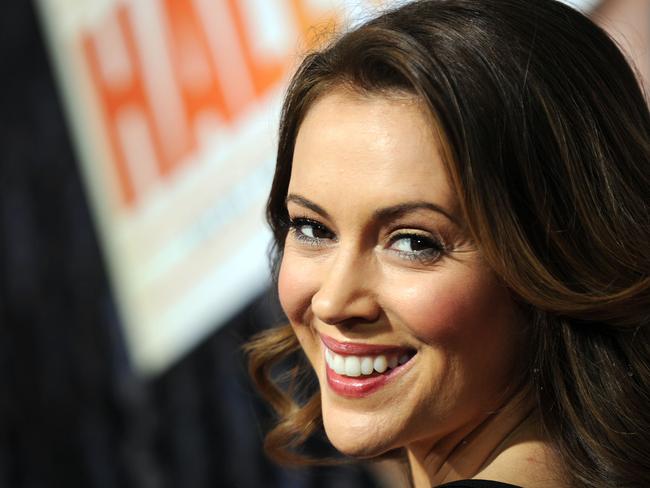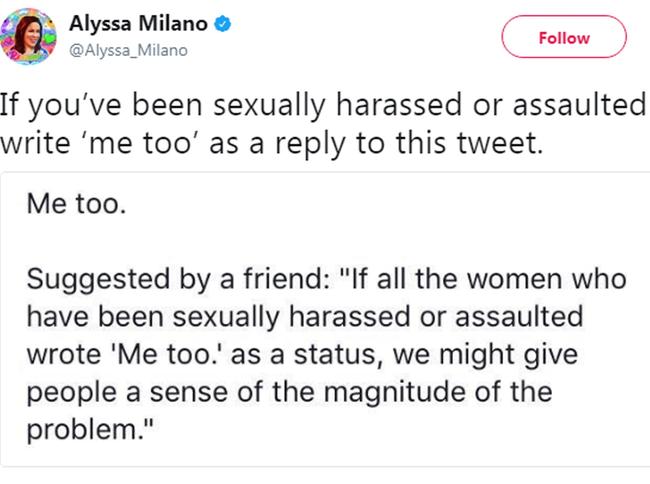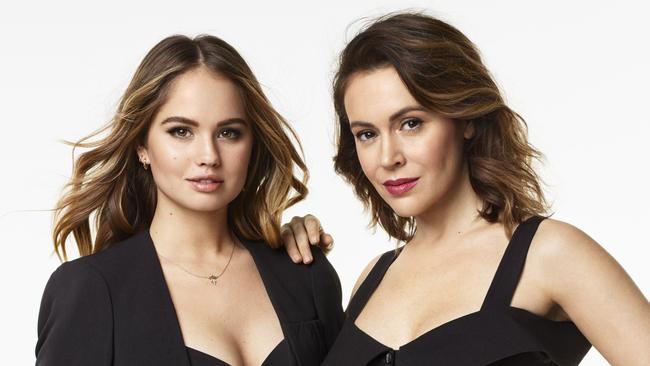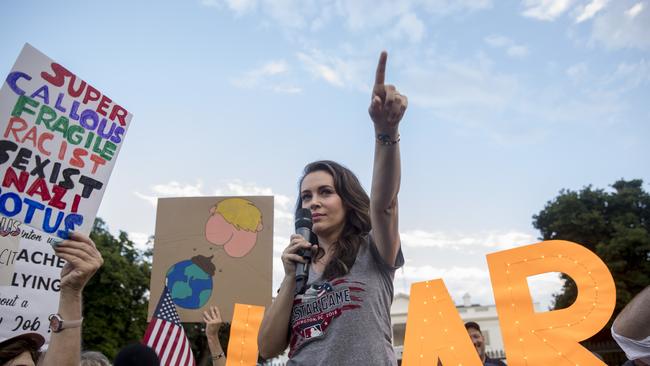Why Alyssa Milano isn’t ready to share her MeToo nightmare
ALYSSA Milano was the driving force behind a movement that shed light on years of atrocities committed by some of Hollywood’s male elite, but the actress-turned-activist isn’t ready to share her own personal nightmare just yet.
Confidential
Don't miss out on the headlines from Confidential. Followed categories will be added to My News.
ALYSSA Milano was the driving force behind a movement that shed light on years of atrocities committed by some of Hollywood’s male elite, but the actress-turned-activist still isn’t ready to share her own personal nightmare.
Not long after one of Tinseltown’s most powerful producers, Harvey Weinstein, was accused of sexual abuse last year, a friend sent the Who’s The Boss and Charmed star a screenshot that read: “Me too. Suggested by a friend: “If all the women who have been sexually harassed or assaulted wrote ‘Me too’ as a status, we might give people a sense of the magnitude of the problem.”

Milano, who will appear in the upcoming Netflix comedy Insatiable, posted the image to Twitter on October 15 last year with the simple message: “If you’ve been sexually harassed or assaulted write ‘me too’ as a reply to this tweet.” The response was immediate and monumental. Within a day the hashtag #metoo had been used 12 million times across various social media platforms and was illiciting responses from women — and men — from across the globe.

Some of the highest profile women in Hollywood, including Reese Witherspoon, Angelina Jolie and Gwyneth Paltrow, shared their stories. Others indicated they had been victims of sexual assault within in the industry, and a long list of alleged perpetrators quickly took shape.
MORE STORIES BY DAVID MEDDOWS
HUGH SHERIDAN’S DESPERATE PLEA TO LOCAL FILM INDUSTRY
REBEL PRODUCER’S PLANS TO ENSURE AUSSIE FILMS GET SEEN AT HOME
It has been one of the biggest social movements since the 1960s and while Milano is responsible for fuelling the revolution, she isn’t yet ready to publicly recount the abuse she suffered as a young actress.
“I still talk to my therapist about all of that,” she tells Insider. “My experiences are still very much alive inside of me and even though they happened so long ago, I’m still trying to find where they belong in my being and in work and in my parenting and in my marriage.”

Milano hasn’t ruled out sharing her story, but says the time has to be right before she does so.
“To tell something so personal, so hard, I think I have to be in a place where I’m ready for that and I’m not there,” she says.
Interestingly Milano says the initial aim of the Me Too movement was to get an indication of the scale of abuse, numbers that could demonstrate how widespread the problem was.

When women also started sharing their personal horror stories, it added another dimension to the cause.
“In the beginning it wasn’t about telling personal stories — although women felt comfortable enough to do that and I think that’s awesome — it was more about showing how huge and wide this issue is by just numbers and really taking control back from the predator and putting in on the victim. It was about getting an idea of those numbers so people understood the prevalence,” Milano said.
In October last year alone, accusations were levelled against a number of high profile men in Hollywood. David Blaine, Ben Affleck, Nelly and Jeremy Piven were just a few.
Acclaimed actor Kevin Spacey was also accused by multiple men of sexual assault and harassment or making advances towards underage boys. He was sacked from House of Cards by Netflix and police in both the US and UK are investigating a number of the claims.
As the months went on more and more men had the spotlight directed at them. Jeffrey Tambor, Louis CK, Sylvester Stallone, James Franco and Scott Baio are just a few of accused. In May Oscar-winning actor Morgan Freeman was accused of inappropriate behaviour by eight women.
In a statement Freeman strenuously denied the allegations and said his long and illustrious film legacy was on the line.
“I am devastated that 80 years of my life is at risk of being undermined, in the blink of an eye, by Thursday’s media reports,” he said in a statement following the accusations.
“But I also want to be clear: I did not create unsafe work environments. I did not assault women. I did not offer employment or advancement in exchange for sex. Any suggestion that I did so is completely false.”
Many others who have had the finger pointed at them have also denied the claims, with little other recourse than releasing a statement and hoping for the best. It is for this reason there has been a significant dissenting voice against the #metoo movement.
Canadian author Margaret Atwood, who wrote The Handmaid’s Tale and Alias Grace, is one who is wary of this new system of justice.
“But understandable and temporary vigilante justice can morph into a culturally solidified lynch-mob habit in which the available mode of justice is thrown out the window,” she wrote as part of a larger op-ed for Canada’s Globe and Mail.
French actress Catherine Deneuve lead a group of 100 women from the arts, business and academia who claimed in an open letter that #metoo had gone too far.
“Rape is a crime, but insistent or clumsy flirting is not an offense, nor is gallantry macho aggression,” it read.

